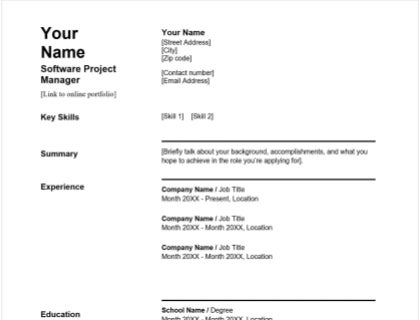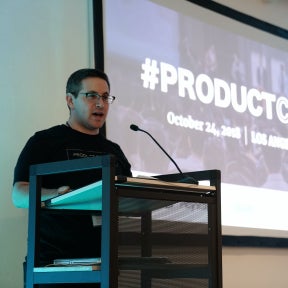
Software Project Manager Resume Free Template
Download this software project manager resume template in Microsoft Word format.
Download NowSoftware Project Manager Resume Example:
Your Name
Software Project Manager
[Link to online portfolio]
[Street address]
[City]
[Zip code]
[Contact number]
[Email address]
Summary:
[Briefly talk about your background, skills, and qualifications.]
Key Skills:
[Skill 1]
[Skill 2]
Experience:
Company Name / Job Title Month 20XX - Present, Location
Company Name / Job Title Month 20XX - Month 20XX, Location
Company Name / Job Title Month 20XX - Month 20XX, Location
Education:
School Name / Degree Month 20XX - Month 20XX, Location
School Name / Degree Month 20XX - Month 20XX, Location
Certification:
[Certificate 1]
[Certificate 2]
Notable Achievements:
[Achievement 1]
[Achievement 2]
Awards and Promotions:
[Award of excellence 1]
[Job promotion 1]
How to Write a Software Project Manager Resume:

A complete guide to writing a software project manager resume with a free template.
Start with a summary.
Make your summary stand out.

You'd need your summary to create a great first impression, intriguing employers enough to continue reading your resume. Start by showcasing your most desirable qualities including your skills, years of experience, and top achievements.
Keep your summary short and to the point.

Aim to keep your summary under four sentences and only include the most pertinent information. Add a sentence about how your specific skill set and experience will benefit the employer's organization.
Showcase your technical skills.
Start with your most important skills.

Showcase your software project management expertise at the top of the page to catch the attention of the screener. Make a bulleted list that includes skills such as software development, project scheduling, budget management, effective communication, and more.
Be sure to mention all relevant skills that could set you apart from other candidates.
Match your skill set with the job posting.

You'll want to directly match your skills with the job requirements. List all relevant skills and competencies you have acquired over time. Do not list skills that will not be needed for the position.
Be truthful.

When listing your skills, remain honest about your level of expertise as the hiring process may require practical assessments.
List your professional experience.
Add your experience in reverse chronological order.

The work experience section is an imperative part of your resume as employers will want to read about the software projects you've managed in previous roles. You'll want to start this section with your most recent position.
Add the places you have worked.

Be sure to pay special attention to the responsibilities you were assigned in previous positions. This will help employers envisage you in the role and determine the type of projects you're knowledgeable in.
Outline your education information.
List your qualifications.

In reverse chronological order, add your qualifications. Each qualification entry should mention an institution name, the dates of attendance, and a location.
Software project managers typically have a degree in computer science, business management, or a related field.
Mention qualifications in progress.

If you're studying towards a qualification, mention it at the start of this section. Omit the initial date and instead include the words "In Progress."
Add your certifications.
List any relevant certificates.

While your portfolio of software projects already reveals a lot about you and your abilities, to help improve your chances of an interview, consider adding relevant certifications, even if not required.
Start with your most relevant certificate.

If you obtained more than one certificate, consider which one employers would be most interested in and mention it first.
Common project management certificates with an emphasis on software development, include:
- Project Management Professional.
- Certified Associate in Project Management.
Add certification details.

You'll want to include the institution and the date you obtained your certification. Certificates awarded by accredited institutions indicate to employers that you have formal training and that you're passionate about your job.
Highlight your achievements.
Add notable career highlights.

Your career milestones are a great addition to your resume because they act as solid references, proving to employers that you're more than capable of exceeding their expectations.
You'll immediately want to capture an employer's attention, so start this section with the most notable software projects you've managed.
Showcase major completed projects.

You'll want to provide sufficient details, for example, software projects you are particularly proud of.
These can include, for example, leading a team of UI designers to ensure optimized user experience, overseeing the adding of new features and functionalities that boosted engagement with an application, delivering a complex software project on time and within budget, and more.
Be sure to include metrics to emphasize the impact your achievements had on the business. The more specific, the better.
List any professional awards and job promotions.
Add key career moments at the end of your resume.

These typically include professional achievements such as awards of merit or job promotions that may be of particular interest to employers.
Provide the details of your professional achievements.

Use bullet points to briefly describe each accomplishment and list them in reverse chronological order. Remember that each entry should also identify the institution/employer. Don't neglect to provide a date.
What employers look for in a software project manager's resume:
- Assuming leadership roles.
- Good presentation skills and the use of data visualization.
- Finding creative solutions to problems.
- Effectively managing risk.
- Managing a diverse team of skilled professionals and collaborating with different departments.
- Effective written and verbal communication.
- Excellent interpersonal skills.
- Diligence, organizational skills, and attention to detail.
- Managing budgets.
- A relevant degree in computer science or business management.
- A project management certificate will benefit you.
- A link to your online portfolio that showcases a wide range of software development projects that you've managed.


